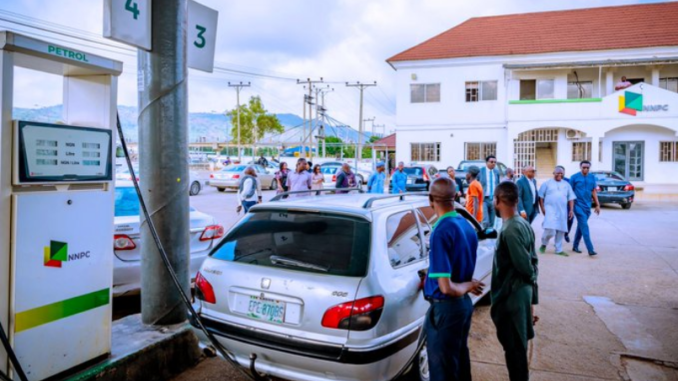
Nigeria’s petrol prices could experience a sharp drop in 2025, with experts forecasting a reduction to as low as N500 per litre. This anticipated decrease, which would mark a dramatic shift in the country’s fuel pricing structure, comes after months of speculation about the effects of deregulation, local refinery expansion, and other key industry developments....CLICK HERE TO READ THE FULL ARTICLE➤
Currently, petrol prices across the country range from N900 to N950 per litre, a figure that has been a point of contention for consumers who have been struggling with the rising cost of living. However, stakeholders in Nigeria’s oil and gas industry are optimistic that prices will crash significantly over the next year.
In an exclusive interview with Saturday Sun, industry players shared their projections for the future of petrol pricing, emphasizing the influence of key factors such as the government’s deregulation policy, the recent stabilization of the naira, and the introduction of new refineries into the market.
Deregulation, New Refineries, and Price Competition Driving Change
The deregulation of Nigeria’s downstream oil sector, a decision made by the federal government, is expected to play a major role in reducing petrol prices. Industry insiders have argued that the policy will create a competitive environment, which will benefit consumers in the form of lower fuel prices.
“The deregulation is a game-changer for the sector,” said Ukadike Chinedu, the National Publicity Secretary of the Independent Petroleum Marketers Association of Nigeria (IPMAN). “As we see more refineries come online and local production increases, we anticipate a drop in petrol prices. We’re looking at a potential drop to N500 per litre in the coming months.”
Chinedu explained that the implementation of the naira-for-crude policy, alongside a stable foreign exchange environment, would further strengthen the local refining sector and provide more competitive pricing. This policy allows the sale of crude oil to local refineries to be settled in naira rather than foreign currency, which should reduce the pressure on Nigeria’s foreign exchange reserves.
Refineries and Increased Domestic Production
A major driver of the expected price reduction is the ramping up of local production from both established and new refineries. The Dangote Refinery, which is currently producing 7 million litres of petrol per day, has already contributed to a price drop in recent months, increasing its local supply of petrol.
“The increased production from Dangote Refinery has already begun to push prices down,” said Chinedu. “This is a clear signal that when more players join the market, the competition will intensify, which will lead to even lower prices.”
The recent resumption of operations at the Warri and Port Harcourt refineries further signals a promising future for Nigeria’s downstream sector. Despite challenges in capacity and operational issues, these refineries are beginning to contribute to the country’s petrol supply, which will reduce the need for imports. At the moment, the country imports a significant portion of its petrol, with local refineries accounting for only about 20% of the total daily consumption.
As more refineries like Warri and Port Harcourt increase their output, the need for costly petrol imports will diminish, which is expected to have a significant impact on domestic fuel prices. The Port Harcourt refinery, for example, is currently blending petrol and producing diesel, with plans to increase its petrol output in the near future.
Modular Refineries Expanding Capacity
Alongside the large-scale refineries, modular refineries—small-scale refineries that can process crude oil into refined products—are also expanding their operations. Though most modular refineries in Nigeria currently focus on diesel production, many are now planning to diversify into petrol refining.
According to Chinedu, the increased activity in the modular refinery sector is another promising sign for the future of petrol prices in Nigeria. “More modular refineries are starting to focus on petrol refining. This is a direct result of the improving market conditions and growing demand for locally refined products,” he said.
Industry analysts believe that the gradual increase in local refining capacity will help stabilize the price of petrol, especially once the modular refineries scale up their operations and contribute more significantly to the domestic supply.
A Competitive Market and Lower Prices
The growing number of players in the refining sector is expected to increase price competition, which will benefit Nigerian consumers. As refineries compete for market share, petrol prices will likely be driven down further. This will be especially evident as the federal government continues to support deregulation, allowing more room for private refineries to operate and offer competitive prices.
In line with these expectations, the President of the Petroleum Products Retail Owners Association of Nigeria (PETROAN), Billy Harry, echoed similar sentiments, stating that the combination of deregulation and increased refinery output would soon lead to more affordable fuel for Nigerians.
“With the increase in local refining capacity and the healthy competition in the market, the potential for lower fuel prices is very real,” Harry said. “Nigerians should expect cheaper petrol in 2025, and the fact that we are already seeing reductions in ex-depot prices indicates that the trend is heading in the right direction.”
A Positive Outlook for 2025
As 2025 approaches, there is growing optimism among industry players and consumers alike. With the combination of deregulation, new and expanding refineries, and a favorable foreign exchange policy, experts are confident that Nigeria’s petrol prices will see significant reductions in the coming year.
“By mid-2025, we could see prices as low as N500 per litre, and this would be a huge win for the Nigerian consumer,” said Iche Idoko, Publicity Secretary of the Crude Oil Refiners Association of Nigeria (CORAN). “Deregulation is bringing about healthy competition, and this will ultimately benefit Nigerians by providing them with cheaper fuel options.”
Be the first to comment